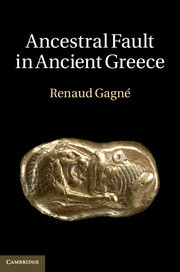Description
Ancestral Fault in Ancient Greece
Author: Gagné Renaud
This book traces the trajectories of a key idea of ancient Greek culture through three thousand years of literature and reception.
Language: EnglishApproximative price 140.09 €
In Print (Delivery period: 14 days).
Add to cart
Ancestral Fault in Ancient Greece
Publication date: 11-2013
564 p. · 15.7x23.5 cm · Hardback
Publication date: 11-2013
564 p. · 15.7x23.5 cm · Hardback
Approximative price 45.81 €
In Print (Delivery period: 14 days).
Add to cart
Ancestral Fault in Ancient Greece
Publication date: 06-2016
Support: Print on demand
Publication date: 06-2016
Support: Print on demand
Description
/li>Contents
/li>Biography
/li>
Ancestral fault is a core idea of Greek literature. 'The guiltless will pay for the deeds later: either the man's children, or his descendants thereafter', said Solon in the sixth century BC, a statement echoed throughout the rest of antiquity. This notion lies at the heart of ancient Greek thinking on theodicy, inheritance and privilege, the meaning of suffering, the links between wealth and morality, individual responsibility, the bonds that unite generations and the grand movements of history. From Homer to Proclus, it played a major role in some of the most critical and pressing reflections of Greek culture on divinity, society and knowledge. The burning modern preoccupation with collective responsibility across generations has a long, deep antecedent in classical Greek literature and its reception. This book retraces the trajectories of Greek ancestral fault and the varieties of its expression through the many genres and centuries where it is found.
Introduction; 1. The theology of progonikon hamartēma; 2. Haereditarium piaculum and inherited guilt; 3. The earliest record: exōleia in Homer and Hesiod; 4. Sympotic theologies: Alcaeus, Solon, and Theognis; 5. Tracking divine punishment in Herodotus; 6. Tragic reconfigurations: Labdacids; 7. Tragic reconfigurations: Atridae; Conclusion.
Renaud Gagné is a University Lecturer in Classics at the University of Cambridge and a Fellow of Pembroke College, Cambridge. His main research interests are early Greek poetry and Greek religion. He is a co-editor of Choral Mediations in Greek Tragedy (Cambridge, 2013) and Sacrifices humains. Perspectives croisées et représentations (2013).
© 2024 LAVOISIER S.A.S.





